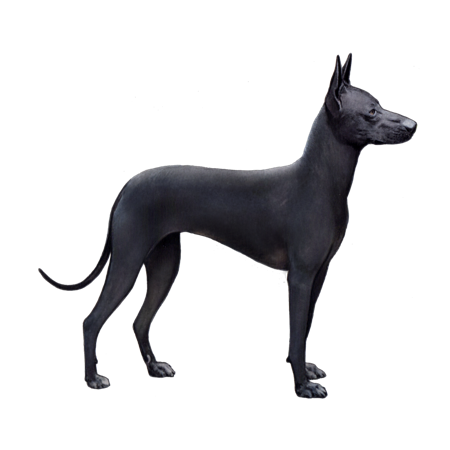
Black Russian Terrier
Black Russian Terriers are intelligent, good-tempered, and extremely reliable dogs. They make top-notch guard dogs because they're loyal to family, protective of their territory, and suspicious of strangers.
Interested in discovering if your dog is a Black Russian Terrier?
Check out Wisdom Panel's DNA tests.

Black Russian Terrier Traits
General Appearance
Big and brawny, Black Russian Terriers emanate strength, power, and agility.
Coat and Coloring
The Black Russian Terrier has a tousled double coat that is coal-black, with or without a scattering of gray hair.
Distinctive Physical Traits
When you take a close look at the Black Russian Terrier, you'll notice a muscular body structure, large head, thick neck, and prominent chest.
Black Russian Terrier Temperament
Black Russian Terriers are calm and self-assured. They may seem aloof around strangers. And though they're generally good with other pets, Black Russian Terriers can sometimes be reactive toward other dogs.
In addition to being smart, curious, and playful, Black Russian Terriers are courageous and prepared to protect their home, territory, and family.


Black Russian Terrier History
The Black Russian Terrier is a relatively new breed that the Soviet Red Army developed during the 1940s. Intended to be part of the Russian military forces, this breed needed to be large, strong, high-spirited, capable, and trainable. It also had to be able to endure harsh Russian winters.
Under the direction of Colonel G. Medvedev, breeders created the Black Russian Terrier by crossing Airedales, Giant Schnauzers, Rottweilers, and 14 other breeds.
The popularity of the Black Russian Terrier has since spread throughout the Soviet Union, Europe, and the United States. The American Kennel Club officially recognized the breed in 2004.
Black Russian Terrier Care
Nutrition
Black Russian Terriers require a high-quality dog food that is age-appropriate—whether it's commercially manufactured or homemade (under a veterinarian's supervision and approval).
As you should with any dog, keep an eye on the amount of food you give your Black Russian Terrier and reduce the portions if your pup gains weight. Also, remember that giving too many treats can contribute to obesity.
Grooming
This breed's dense undercoat is covered by a thick, protective outer coat. As such, the Black Russian Terrier needs regular grooming with meticulous brushing once or twice a week to prevent matting.
Exercise
Whether it's a fast-paced walk, a long run, or hiking adventure, Black Russian Terriers enjoys all types of physical exercise. And they need it, too, thriving with a minimum of 30–45 minutes of daily exercise. Without enough physical activity or sufficient family time, they may become unhappy, destructive dogs.
Black Russian Terriers typically excel in many canine sports. These include rally obedience, agility, lure coursing, dock diving, cart pulling, K-9 nose work, tracking, and more.
Training
Black Russian Terriers respond well to reward-based training techniques (never punishment-based) using treats and favorite toys.
To thwart aggressive behaviors in an adult Black Russian Terrier, you must start socialization and obedience training during puppyhood and continue throughout the dog's life. An untrained Black Russian Terrier may become forceful with anyone they think they can bully.

Black Russian Terrier Genetic Health Conditions
-
Hyperuricosuria
Hyperuricosuria (HUU) is a condition that predisposes affected dogs to the formation of urinary stones, such as kidney or bladder stones.
-
Juvenile Laryngeal Paralysis and Polyneuropathy
Juvenile laryngeal paralysis and polyneuropathy (JLPP) causes difficulty breathing and swallowing due to voice box (larynx) paralysis.
Knowing if your Black Russian Terrier is a carrier or at-risk for these conditions can help you and your veterinarian plan for your pup’s lifelong care. With Wisdom Panel™ Premium, you can get results for over 200 genetic health tests.
Breed Group
Terrier
The Terrier Group ancestors were bred to hunt and kill vermin. They are often characterized as feisty and energetic dogs whose sizes range from fairly small to much larger.
Resources
https://www.akc.org/dog-breeds/black-russian-terrier/
https://guardianbearskennel.com/characteristics-black-russian-terrier
Reviewed July 26, 2020 by Cindy Elston, DVM, MPH
































































